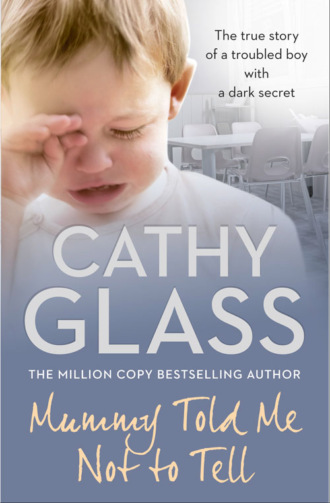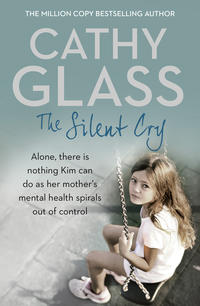
Полная версия
Mummy Told Me Not to Tell: The true story of a troubled boy with a dark secret
‘I see,’ I said, feeling that possibly it wasn’t as bad as it had first appeared: jealousy of the other boy causing the first placement breakdown; an inexperienced carer out of her depth the second; (possible) illness for the third; and work commitment for the fourth. ‘Why isn’t he in school?’ I asked.
‘It doesn’t say and the duty social worker didn’t know. Perhaps it was because of all the moves. Reece’s social worker is Jamey Hogg but he is on extended leave until the end of February. I’ll give the team manager a ring and see if anyone can tell you more. I’m going to a meeting shortly, so I’ll ask them to phone you direct.’
‘Thanks, Jill.’
‘You’re welcome. I’m sure Reece will settle with you.’
As we said goodbye I thought the same as Jill would be thinking, that Reece was going to have to settle with me because one thing was for certain: he couldn’t have another change of carer. I would have to make sure he settled, for without a stable home life there was no hope of getting his behaviour back on track. Half an hour later the phone rang again and Karen introduced herself as a colleague of Jamey Hogg, working in the same team at the social services. She was phoning to give me some more details, and these weren’t good news.
‘I know Reece’s family,’ she began. ‘I was their social worker for a while. Reece was brought into care at the same time as his half-sister, Susie. She is ten and with another local carer. They couldn’t be placed together, as none of the carers available had two free bedrooms. Although Susie and Reece have different fathers, they are the closest of the siblings. There are four older half-brothers and sisters but they were removed from home years ago. The eldest, Sharon, is eighteen now. Reece has witnessed a high level of violence in the family home, and goodness-knows what else. His father, Scott, has served time in prison for assault, among other things. While he was inside he made some pretty undesirable friends who have become regular visitors to the house, including at least one paedophile.
‘I see,’ I said slowly, not liking what I was hearing.
‘When I was on the case I found a very poor level of hygiene in the house,’ Karen continued. ‘Susie and Reece were very dirty and smelt of stale urine. Mum is very loud and aggressive and the whole family shout at the top of their voices the whole time in order to be heard. Reece seems to have spent most of his waking hours in front of the television. When I last visited, although I was expected, he and Susie were watching an X-rated horror movie. Mum couldn’t see anything wrong in that and refused to switch it off. Reece is large for his age, heavily built, and he is developmentally delayed. He’s functioning at a pre-school level in many respects. Oh yes, and Reece bites. Mum nicknamed him Sharky some years back and it has stuck.’
‘He’s called Sharky because he bites?’ I asked, astonished.
‘Yes, I know, appalling, isn’t it? Mum and dad have indulged his behaviour. They seem to find it amusing, and even actively encourage it. They laugh at him when he bites, and throw food in his direction, which he tears apart with his front teeth. He also bites objects and people. One of the reasons for his exclusion from his previous schools was biting.’
I was silent, trying to take in what I’d just heard.
‘He has been excluded from two primary schools to my knowledge,’ Karen continued, ‘and he has had very poor school attendance since he first started school. The education department has been informed that Reece will be coming to you, so they will be looking for a school for him near you.’ Karen paused. ‘What else can I tell you?’
‘Contact? Will he be seeing any of his family?’
‘Yes. He’ll be seeing his parents and his half-sister Susie each week at supervised contact. He may also see some of his other half-brothers — it hasn’t been decided yet. I don’t know yet where the contact will take place. We were using the Headline Family Centre but mum has been banned from there. She has also been banned from the other family centre, Kid-Care. She’s a very aggressive woman.’
‘She must be. I’ve never heard of anyone being banned from both the family centres before.’
‘No, neither have I, but believe me, her behaviour merited it. Reece has obviously seen a lot of violence at home, and when he is frustrated he resorts to aggression. There have been no boundaries at home, no discipline at all. My feeling is that he and Susie should have been removed years ago.’
‘So why weren’t they?’
Karen sighed. ‘I don’t know. Unfortunately there have been a lot of changes of social worker, and mum is very good at getting what she wants and controlling people. She shouts and threatens, and with her volatile and erratic behaviour most professionals who have dealt with her just seem pleased to get away in one piece. When we removed Reece and Susie, there were two social workers and three police officers present, and there was only mum and the two children at home. You can’t reason with her: it’s impossible. She often comes into the council offices and we have to have security remove her. She was in again this morning, demanding to know where Reece was being moved to. We didn’t tell her, obviously.’
Good, I thought, and please make sure my contact details aren’t accidentally disclosed, as had sometimes happened in the past with previous placements.
‘From what I know of Reece,’ Karen said, trying to finish on a positive note, ‘he’s not really a bad kid. I’m sure his aggression is learned behaviour from home.’
‘Yes, it usually is,’ I agreed.
‘Can you think of anything else I can tell you that might help?’
‘Not at present. Thanks, you’ve been very helpful.’ ‘Thank you for taking Reece. We were getting desperate,’ Karen said.
That evening when Lucy and Paula were home and we’d eaten, I took the opportunity to tell them of our new arrival before they started their homework or television watching. Lucy and Paula were fully aware of the implications of fostering a child with ‘challenging behaviour’ and, knowing they had a well-developed sense of humour, I decided to take a light-hearted approach.
‘Ladies,’ I said, as we loaded the dishwasher, ‘you know what a quiet time we’ve had over the last couple of months — just doing the respite fostering?’ They looked at me cautiously, suspiciously almost. I smiled. ‘Well, I thought it was time for a change, something to liven us up a bit.’ I smiled again. ‘Tomorrow a boy called Reece will be coming to stay with us. He is seven but has learning difficulties, so functions at a much younger age. Although he shouts, bites and hits people when he is frustrated, I’m sure with all our help he will soon change. What he needs more than anything is stability and boundaries—’ and I was about to continue with a few reminders on how we would achieve this when there was a chorus of:
‘Can’t someone else have him?’
I looked at them sombrely. ‘They have. We will be his fifth carers in six weeks.’
Another chorus: ‘You’re joking!’
‘No.’ And I could tell by their expressions they were shocked and knew, as I did, that whatever Reece threw as us, physically or emotionally, he couldn’t have another move, and would stay with us until the court made its decision on his future, which would take the best part of a year, or longer if the case was complicated.
Конец ознакомительного фрагмента.
Текст предоставлен ООО «ЛитРес».
Прочитайте эту книгу целиком, купив полную легальную версию на ЛитРес.
Безопасно оплатить книгу можно банковской картой Visa, MasterCard, Maestro, со счета мобильного телефона, с платежного терминала, в салоне МТС или Связной, через PayPal, WebMoney, Яндекс.Деньги, QIWI Кошелек, бонусными картами или другим удобным Вам способом.









